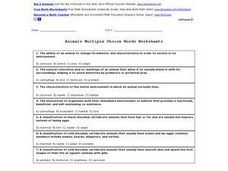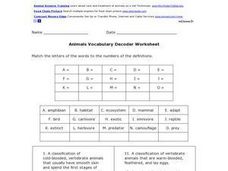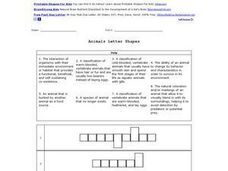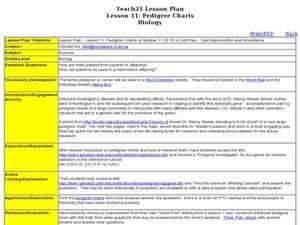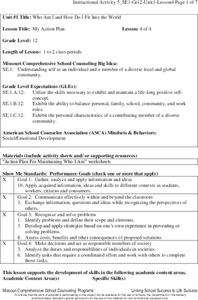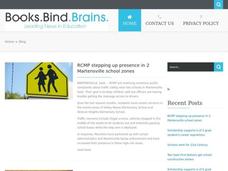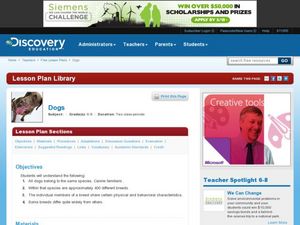Curated OER
Acids and Bases
In this acid and base worksheet, high schoolers read about the characteristics of acid and bases, the pH scale and neutralization reactions. Students match 10 terms with their definitions related to acids, bases and pH, they identify...
Curated OER
Pioneering Children on the Move
Students inquire about life for pioneer children. In this pioneer period lesson, students analyze photographs of children, make information foldables, and create a covered wagon that was typical of the ones of the past. Students will...
Curated OER
Kingdom Animalia ~ A Look at the Five Major Classes
Biological taxonomy masters examine the five main classes under phylum chordata. Pupils compare and contrast the identifying characteristics of the various organisms. They explain why taxonomy is important in classifying organisms. You...
Curated OER
Animals Multiple Choice Words Worksheet
Looking for some simple multiple-choice questions for an upcoming biology unit on animals? This activity features 7 clearly worded questions, each with 4 possible answers. Topics include adaptation, camouflage, ecosystems, animal...
Curated OER
Animals Vocabulary Decoder Worksheet
Add some decoding to your scholar's review of basic life science terms in this decorder activity, where students match 15 words to their definitions. Words such as mammal and amphibian must be matched to their written definition. The...
Curated OER
If The Career Fits, Explore It!
Seventh graders are introduced to the Interest Inventory worksheet. Individually, they complete the inventory to determine the best career for them based on their characteristics. To end the lesson, they are shown their results to be...
Curated OER
Animals Letter Shapes
Add some excitement to a basic life science activity by using this simple word puzzle! Scholars read 8 definitions and write the correct animal-related vocabulary word in the boxes provided. The boxes for each definition show the...
Curated OER
Pedigree Charts
Students explain how offspring inherit traits from their parents. In this biology lesson, students investigate the genes for nicotine addiction using an interactive website. They construct a fictional pedigree using their chosen...
Curated OER
Living vs. Nonliving
Students explore the characteristics that distinguish living things from nonliving things. Students examine video clips and still photographs to gather evidence and develop criteria to decide if something is living or nonliving.
Missouri Department of Elementary
My Action Plan
To complete a study of the importance of developing a positive self-image, high school seniors complete an "Action Plan for Maintaining Who I Am" worksheet. They then submit their finished worksheets for inclusion in their Personal...
Workforce Solutions
Discover Your Interests
For many high schoolers, what they want to be when they grow up can be very intimidating. Here's an activity that gets them thinking about their interests and how they might connect these interests to future jobs. After watching a short...
Lerner Publishing
Teaching Habitats
What makes up a habitat? Use this resource to engage first graders in the exploration of desert, wetland, forest, and ocean habitats. Youngsters classify plants and animals into the four distinct habitats through drawings and cutting and...
University of Georgia
Antacid and Uncle Heartburn
Household materials can be used for more than cleaning! In this collaborative experiment, emerging chemists use products such as vinegar and liquid antacid to explore chemical reactions that commonly occur in the human body.
Curated OER
Alive or Not
In this organism worksheet, students review the characteristics that determine if something is alive or not. This worksheet has 5 fill in the blank and 7 matching questions.
Curated OER
Magical Metamorphosis
Sixth graders compare and contrast incomplete and complete metamorphosis using a Venn Diagram. They predict, observe, measure, and record data on the life cycle of mealworms. Students write and illustrate the life cycle of the mealworm....
Biology Junction
Introduction to Animals Crossword Puzzle
In this introduction to animals instructional activity, students complete a crossword puzzle with 47 questions on the types and characteristics of animals.
Curated OER
Why Are Bees Important?
Students identify and analyze pollination and how bees play an important part in the life cycle of flowering plants. They also identify the process of plant pollination and how bees play an important part in the life cycle of flowering...
Curated OER
Harvesting and Threshing the Seed
Students harvest and thresh the seeds. They count the seeds and compare that number with the original number of seeds planted (8) to determine their profit or loss. Finally, students think about additional questions they have about...
Curated OER
Thinning and Transplanting
Students identify and observe one plant per section in their quad and to transplant the surplus seedlings to empty quads and interpret why this is important. They then discuss the purpose of thinning and transplanting. Finally, students...
Curated OER
Designing Your Future
Eleventh graders demonstrate an understanding of the transitions and changes that they(the students) face in the future and evaluate their own strengths and weaknesses in managing change.
Curated OER
Diversity of Life
Students study the classification of viruses and describe their structure. In this investigative instructional activity students complete an activity and answer questions about viruses.
Curated OER
Dogs- Canine Familiaris
Students research dog species and breeds. In this dog lesson, students discuss breed of dogs, their personal experiences, and complete a Venn Diagram comparing breeds. Students use the research to analyze television shows or movies which...
Curated OER
Leadership (Intermediate)
In order to be a good leader, student need to evaluate their own personality traits. Using this 30 question activity, learners can get a grasp on their strengths and areas that they can improve on to be a better leader.
Curated OER
Plants and Animals
Students find common needs between plants and animals. In this plants and animals lesson students compare that both plants and animals need food and water. They also find the differences between plant and animal needs.





